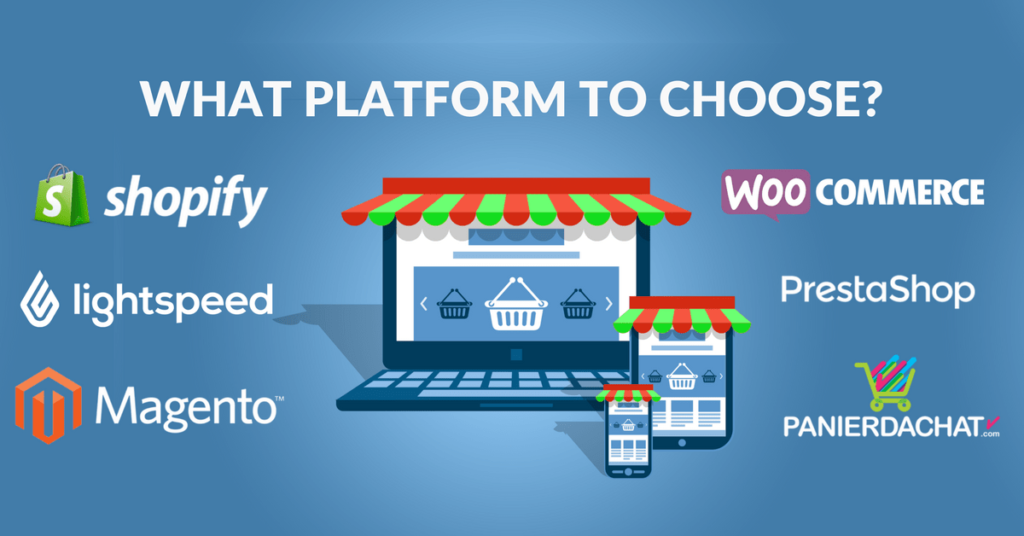
The website platform you choose for your business has a strong influence on how you rank on leading search engines. The ideal website builder can help you build your brand image and develop brand awareness among your target audience.
However, with the eCommerce market flooded with contemporary website building platforms, each featuring numerous options and revolutionary tools, picking the right one for your business is increasingly becoming a daunting task.
The task becomes more complicated when you have to choose a website platform that solely serves your unique type of business.
The leading website platforms for eCommerce websites and CMS websites
Here are some leading website builders categorized for two main categories:
For eCommerce And Online Stores

Shopify
The world’s leading and most favorite website platform is also one of the most simple-to-use. Shopify has the maximum integration capabilities, comprehensive marketing & SEO features, and an expansive network of all payment gateways.
SEO Pros
- You have access to numerous plugins to optimize SEO
- One of the largest communities and unwavering support for SEO
- Very easy to add relevant keywords with keyword rankings
- Excellent speed and uptime
SEO Cons
- Most plugins cost a significant amount of money
- HTML sitemap is chargeable
- Specific SEO features are locked-in and are available only for SEO geeks
- Not that flexible to create content marketing strategies
PrestaShop
The freemium, open-source eCommerce platform is similar to Shopify, designed specifically for online store owners. It’s the perfect platform for newcomers and is extremely user-friendly. A free version is also available. Choosing a hosting provider and installing it should be done all by yourself. This involves additional costs and proves to be a bit costly compared to other website platforms.
SEO Pros
- Several SEO options help your website perform at optimum levels
- Google sitemap is automatically generated
- Useful marketing features help optimize SEO
SEO Cons
- SEO plugins have unexpected costs and are costly
- You have to set SEO options manually
- SEO configuration take more time setting up with additional modules
- You need to find open source sitemap to save time and money
Magento
A professional website builder like Magento ranks as one of the largest eCommerce platforms in the market. It has some of the most exceptional features, including amazing flexibility, enhanced stock management, fully-customizable design, and others.
SEO Pros
- SEO features are customizable from the backend
- You can easily make programmatic SEO changes
- In-built support for HTML, XML, and Robots
SEO Cons
- Admin access is needed to setup SEO and sometimes a developer should install plugins that consume more time
- Additional SEO features cost significantly higher
- Clearing the cache on pages is a cumbersome process
For CMS Websites And Blogging
Weebly
With a DIY approach, Weebly empowers you to build your website free of cost. You can easily edit metadata like tags and descriptions with basic tools. It’s a fairly comprehensive website builder that has all the essential features to get small and medium businesses going.
SEO Pros
- Built-in SEO features for on-page SEO activities
- Simple SEO tools help you understand and setup fast
- Basic SEO support is available
SEO Cons
- Lack of advanced features makes SEO a daunting task
- URLs have .html suffix that is not modern
- Meta keyword boxes should be excluded from sites
Ghost
An able alternative to comprehensive website platforms like WordPress, Ghost has accessible features and amazing customizable capabilities. The revolutionary built-in features help you do away with hiring a developer or having coding skills. It has one of the most simple and straightforward interfaces.
SEO Pros
- Built-in SEO features don’t require additional plugins
- Native AMP integration facility
- Completely customizable and simple metadata editors are all available within
SEO Cons
- It doesn’t have a native HTML sitemap
- Specifically supports bloggers
- Lack of third-party plugins can be restrictive sometimes
Joomla
This free and open-source website builder has a lot of developer support and is suitable for all types of businesses. It’s a popular and powerful tool that offers amazing control over the designing aspect.
SEO Pros
- You have complete control over SEO implementation
- SEO also has comprehensive community support
SEO Cons
- You need extensive developer skills to configure the tools for optimal SEO experience
- Limited guidance available for newcomers
- Lot of settings to change and is time-consuming
The Takeaway
Some eCommerce or website platforms are inherently designed to serve a specific type of business more than others. While building an eCommerce store requires you to choose Shopify or Magento, a content website works better with Ghost or Weebly.
However, now these platforms can be complemented. WordPress also allows you to create online stores and Shopify encourages comprehensive blogging too.
You just need to tweak around and discover what works best for you.
Also Read- How to Improve Your Business with CRO Technology?










